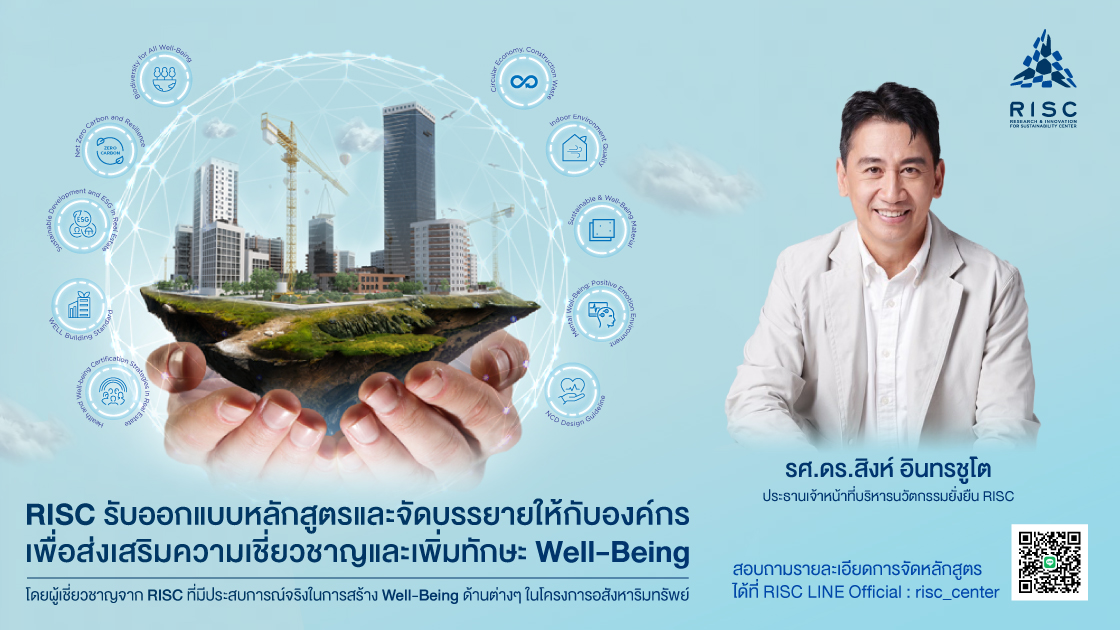ข่าวสาร

Aug 08, 2024 INNOVATION
RISC รับออกแบบหลักสูตรและจัดบรรยายให้กับองค์กรเพื่อส่งเสริมความเชี่ยวชาญและเพิ่มทักษะ Well-Being
องค์กรที่กำลังมุ่งสู่ Well-Being มาร่วมขับเคลื่อน และเพิ่มทักษะ Well-Being ไปกับเรา
RISC รับออกแบบหลักสูตร และจัดบรรยายที่ช่วยส่งเสริมความเชี่ยวชาญ และเพิ่มทักษะ Well-Being ให้ตรงกับความสนใจและทิศทางการเติบโตขององค์กร เพื่อสร้างให้ "ทีมขับเคลื่อนขององค์กร" นำองค์ความรู้ไปปรับใช้กับธุรกิจขององค์กร และต่อยอดเพื่อสร้างความอยู่ดีมีสุข (For All Well-Being) ให้กับสังคม และประเทศต่อไปในอนาคต
หลักสูตร Well-Being ออกแบบ และบรรยายโดยผู้เชี่ยวชาญจาก RISC ที่มีประสบการณ์จริงในการสร้าง Well-Being ด้านต่างๆ ในโครงการอสังหาริมทรัพย์ โดยสามารถเลือกหรือสร้างหลักสูตรเองให้ตรงกับทิศทางและความต้องการขององค์กร ได้จาก 10 หัวข้อนี้
1. Health and Well-Being Certification Strategies in Real Estate: "เกณฑ์มาตรฐานในการพัฒนาอสังหาริมทรัพย์ที่ส่งเสริมสุขภาพและคุณภาพชีวิตที่ดี"
การเข้าใจอย่างลึกซึ้งเกี่ยวกับหลักการของสุขภาพและความเป็นอยู่ที่ดีในด้านอสังหาริมทรัพย์ เพื่อนำมาใช้ในวิธีการออกแบบอาคารต่างๆ รวมทั้งได้เรียนรู้เกี่ยวกับเกณฑ์ของการรับรองมาตรฐานแต่ละประเภท และประโยชน์ที่ได้จากการรับรองเหล่านั้น
2. WELL Building Standard: "มาตรฐานและข้อกำหนด WELL Building Standard"
การเรียนรู้ และเข้าใจเกี่ยวกับที่มาของมาตรฐาน และข้อกำหนดต่างๆ ของ WELL Building Standard และแบ่งปันประสบการณ์ออกแบบสำนักงาน RISC ที่ผ่านการรับรองเป็นแห่งแรกในภูมิภาคเอเชียตะวันออกเฉียงใต้ และประเทศไทย รวมทั้งการได้เรียนรู้วิธีการนำไปประยุกต์ใช้จริงในโครงการอสังหาริมทรัพย์
3. Sustainable Development and ESG in Real Estate: "การพัฒนาอสังหาริมทรัพย์อย่างยั่งยืน และการบูรณาการมิติ ESG ในอุตสาหกรรมการก่อสร้าง"
การเรียนรู้และเข้าใจหลักการของการพัฒนาที่ยั่งยืนในด้านอสังหาริมทรัพย์ และรู้จัก Green Building Certifications ที่มีอยู่ในปัจจุบัน รวมทั้งได้รู้จักเกณฑ์ Environmental, Social, and Governance (ESG) และการประยุกต์ใช้ในโครงการอสังหาริมทรัพย์ และรวมไปถึงการได้เข้าใจแนวคิดการเงินยั่งยืน (Sustainable Finance) ในการพัฒนาโครงการด้านความยั่งยืน
4. Net Zero Carbon and Resilience: "แนวคิด Net Zero Carbon และ Resilience รับมือภาวะโลกรวนและประยุกต์ใช้ในโครงการจริง"
การเข้าใจเกี่ยวกับภาวะโลกรวนที่ส่งผลกระทบต่อโลกของเรา และแนวคิด Net Zero Carbon และ Climate Resilience เพื่อช่วยบรรเทาและรับมือภาวะโลกรวน ก่อนนำแนวทางไปประยุกต์ใช้จริงในโครงการ
5. Biodiversity for All Well-Being: "แนวคิดการส่งเสริมความหลากหลายทางชีวภาพและการประยุกต์ใช้ในโครงการอสังหาริมทรัพย์จริง"
การรู้จักและเข้าใจความหมายของความหลากหลายทางชีวภาพ และอัพเดทสถานการณ์ที่เป็นอยู่ในปัจจุบัน รวมทั้งได้เรียนรู้แนวคิดการดำเนินงานพัฒนาอสังหาริมทรัพย์ที่ช่วยส่งเสริมความหลากหลายทางชีวภาพ หรือการนำไปประยุกต์ใช้ในระดับเมือง เพื่อสนับสนุนให้เกิดการรักษาระบบนิเวศในสิ่งแวดล้อม
6. Circular Economy and Construction Waste: "แนวคิดระบบเศรษฐกิจหมุนเวียนและการบริหารจัดการขยะในอุตสาหกรรมก่อสร้าง"
การเรียนรู้และเข้าใจถึงแนวทางของ Circular Economy หรือเศรษฐกิจหมุนเวียนที่นำมาประยุกต์ในอุตสาหกรรมก่อสร้าง และได้ศึกษาตัวอย่างการพัฒนาโครงการ ซึ่งคำนึงถึงการลดผลกระทบต่อสิ่งแวดล้อมจากการบริหารจัดการขยะในการก่อสร้าง
7. Indoor Environmental Quality: "การออกแบบสภาพแวดล้อมภายในอาคารเพื่อส่งเสริมสุขภาวะที่ดีในการอยู่อาศัย"
การรู้จักและเข้าใจผลกระทบที่เกิดจากสภาพแวดล้อมภายในอาคาร ซึ่งส่งผลต่อสุขภาพผู้อยู่อาศัย เพื่อนำไปสู่แนวทางการออกแบบและจัดการที่อยู่อาศัยที่ช่วยส่งเสริมคุณภาพชีวิตที่ดีภายในอาคาร
8. Sustainable & Well-Being Material: "แนวคิดการเลือกใช้วัสดุก่อสร้างเพื่อการออกแบบที่ยั่งยืน ส่งเสริมสุขภาวะที่ดี และเทรนด์วัสดุก่อสร้างเพื่อลดคาร์บอน"
การเจาะลึกคุณสมบัติของวัสดุก่อสร้างที่ส่งผลกระทบต่อสิ่งแวดล้อมและสุขภาพของผู้อยู่อาศัย เพื่อเป็นแนวทางในการเลือกวัสดุที่ใช้ในการออกแบบอาคารที่ยั่งยืนและส่งเสริมสุขภาวะที่ดีกับผู้ใช้งานได้อย่างเหมาะสม รวมทั้งนวัตกรรมวัสดุก่อสร้างใหม่ๆ เทรนด์ที่เปลี่ยนไปของการใช้วัสดุก่อสร้างเพื่อลดคาร์บอน และแนวทางการพัฒนาโครงการเพื่อบรรลุเป้าหมายอาคารคาร์บอนสุทธิเท่ากับศูนย์ (Net Zero Carbon)
9. NCDs Design Guideline: "แนวทางการออกแบบและปรับสภาพแวดล้อม เพื่อลดการเกิดโรค NCDs"
การเข้าใจที่มาและความสำคัญของกลุ่มโรค NCDs (Non Communicable Diseases) และสภาพแวดล้อมรอบตัวที่ส่งผลกระทบต่อสุขภาพกาย และความเสี่ยงที่กระตุ้นการเกิดโรค NCDs รวมทั้งแนวทางการออกแบบเพื่อลดแนวโน้มการเกิดโรค NCDs เพื่อนำไปใช้ในการออกแบบผ่าน Guideline สำหรับปรับใช้กับอาคารต่างๆ
10. Mental Well-Being: Positive Emotion Environment: "การออกแบบด้วยองค์ความรู้ด้านประสาทวิทยา เพื่อสร้างการรับรู้เชิงบวก"
การเจาะลึกการออกแบบอาคารและสภาพแวดล้อมด้วยองค์ความรู้ด้านประสาทวิทยา ผ่านความเข้าใจการรับรู้ของมนุษย์ และอิทธิพลของสภาพแวดล้อมที่ส่งผลต่อความรู้สึก ที่นำไปสู่ "การรับรู้ที่ดี" ที่ส่งผลโดยตรงทั้งทางร่างกายและจิตใจ สร้างความผ่อนคลาย เพิ่มสมาธิจดจ่อ ลดความเครียด วิตกกังวล ตลอดจนลดแนวโน้มการเกิดภาวะซึมเศร้า หรือสมองเสื่อมได้
หน่วยงาน หรือองค์กรที่กำลังมุ่งสู่ Well-Being สามารถเลือกและสร้างหลักสูตรให้ตรงตามวัตถุประสงค์ขององค์กร หรือให้ RISC ออกแบบหลักสูตรให้ตรงกับทิศทางองค์กรได้
ติดต่อสอบถามรายละเอียดการจัดหลักสูตร ได้ที่ RISC LINE Official : risc_center
RISC รับออกแบบหลักสูตร และจัดบรรยายที่ช่วยส่งเสริมความเชี่ยวชาญ และเพิ่มทักษะ Well-Being ให้ตรงกับความสนใจและทิศทางการเติบโตขององค์กร เพื่อสร้างให้ "ทีมขับเคลื่อนขององค์กร" นำองค์ความรู้ไปปรับใช้กับธุรกิจขององค์กร และต่อยอดเพื่อสร้างความอยู่ดีมีสุข (For All Well-Being) ให้กับสังคม และประเทศต่อไปในอนาคต
หลักสูตร Well-Being ออกแบบ และบรรยายโดยผู้เชี่ยวชาญจาก RISC ที่มีประสบการณ์จริงในการสร้าง Well-Being ด้านต่างๆ ในโครงการอสังหาริมทรัพย์ โดยสามารถเลือกหรือสร้างหลักสูตรเองให้ตรงกับทิศทางและความต้องการขององค์กร ได้จาก 10 หัวข้อนี้
1. Health and Well-Being Certification Strategies in Real Estate: "เกณฑ์มาตรฐานในการพัฒนาอสังหาริมทรัพย์ที่ส่งเสริมสุขภาพและคุณภาพชีวิตที่ดี"
การเข้าใจอย่างลึกซึ้งเกี่ยวกับหลักการของสุขภาพและความเป็นอยู่ที่ดีในด้านอสังหาริมทรัพย์ เพื่อนำมาใช้ในวิธีการออกแบบอาคารต่างๆ รวมทั้งได้เรียนรู้เกี่ยวกับเกณฑ์ของการรับรองมาตรฐานแต่ละประเภท และประโยชน์ที่ได้จากการรับรองเหล่านั้น
2. WELL Building Standard: "มาตรฐานและข้อกำหนด WELL Building Standard"
การเรียนรู้ และเข้าใจเกี่ยวกับที่มาของมาตรฐาน และข้อกำหนดต่างๆ ของ WELL Building Standard และแบ่งปันประสบการณ์ออกแบบสำนักงาน RISC ที่ผ่านการรับรองเป็นแห่งแรกในภูมิภาคเอเชียตะวันออกเฉียงใต้ และประเทศไทย รวมทั้งการได้เรียนรู้วิธีการนำไปประยุกต์ใช้จริงในโครงการอสังหาริมทรัพย์
3. Sustainable Development and ESG in Real Estate: "การพัฒนาอสังหาริมทรัพย์อย่างยั่งยืน และการบูรณาการมิติ ESG ในอุตสาหกรรมการก่อสร้าง"
การเรียนรู้และเข้าใจหลักการของการพัฒนาที่ยั่งยืนในด้านอสังหาริมทรัพย์ และรู้จัก Green Building Certifications ที่มีอยู่ในปัจจุบัน รวมทั้งได้รู้จักเกณฑ์ Environmental, Social, and Governance (ESG) และการประยุกต์ใช้ในโครงการอสังหาริมทรัพย์ และรวมไปถึงการได้เข้าใจแนวคิดการเงินยั่งยืน (Sustainable Finance) ในการพัฒนาโครงการด้านความยั่งยืน
4. Net Zero Carbon and Resilience: "แนวคิด Net Zero Carbon และ Resilience รับมือภาวะโลกรวนและประยุกต์ใช้ในโครงการจริง"
การเข้าใจเกี่ยวกับภาวะโลกรวนที่ส่งผลกระทบต่อโลกของเรา และแนวคิด Net Zero Carbon และ Climate Resilience เพื่อช่วยบรรเทาและรับมือภาวะโลกรวน ก่อนนำแนวทางไปประยุกต์ใช้จริงในโครงการ
5. Biodiversity for All Well-Being: "แนวคิดการส่งเสริมความหลากหลายทางชีวภาพและการประยุกต์ใช้ในโครงการอสังหาริมทรัพย์จริง"
การรู้จักและเข้าใจความหมายของความหลากหลายทางชีวภาพ และอัพเดทสถานการณ์ที่เป็นอยู่ในปัจจุบัน รวมทั้งได้เรียนรู้แนวคิดการดำเนินงานพัฒนาอสังหาริมทรัพย์ที่ช่วยส่งเสริมความหลากหลายทางชีวภาพ หรือการนำไปประยุกต์ใช้ในระดับเมือง เพื่อสนับสนุนให้เกิดการรักษาระบบนิเวศในสิ่งแวดล้อม
6. Circular Economy and Construction Waste: "แนวคิดระบบเศรษฐกิจหมุนเวียนและการบริหารจัดการขยะในอุตสาหกรรมก่อสร้าง"
การเรียนรู้และเข้าใจถึงแนวทางของ Circular Economy หรือเศรษฐกิจหมุนเวียนที่นำมาประยุกต์ในอุตสาหกรรมก่อสร้าง และได้ศึกษาตัวอย่างการพัฒนาโครงการ ซึ่งคำนึงถึงการลดผลกระทบต่อสิ่งแวดล้อมจากการบริหารจัดการขยะในการก่อสร้าง
7. Indoor Environmental Quality: "การออกแบบสภาพแวดล้อมภายในอาคารเพื่อส่งเสริมสุขภาวะที่ดีในการอยู่อาศัย"
การรู้จักและเข้าใจผลกระทบที่เกิดจากสภาพแวดล้อมภายในอาคาร ซึ่งส่งผลต่อสุขภาพผู้อยู่อาศัย เพื่อนำไปสู่แนวทางการออกแบบและจัดการที่อยู่อาศัยที่ช่วยส่งเสริมคุณภาพชีวิตที่ดีภายในอาคาร
8. Sustainable & Well-Being Material: "แนวคิดการเลือกใช้วัสดุก่อสร้างเพื่อการออกแบบที่ยั่งยืน ส่งเสริมสุขภาวะที่ดี และเทรนด์วัสดุก่อสร้างเพื่อลดคาร์บอน"
การเจาะลึกคุณสมบัติของวัสดุก่อสร้างที่ส่งผลกระทบต่อสิ่งแวดล้อมและสุขภาพของผู้อยู่อาศัย เพื่อเป็นแนวทางในการเลือกวัสดุที่ใช้ในการออกแบบอาคารที่ยั่งยืนและส่งเสริมสุขภาวะที่ดีกับผู้ใช้งานได้อย่างเหมาะสม รวมทั้งนวัตกรรมวัสดุก่อสร้างใหม่ๆ เทรนด์ที่เปลี่ยนไปของการใช้วัสดุก่อสร้างเพื่อลดคาร์บอน และแนวทางการพัฒนาโครงการเพื่อบรรลุเป้าหมายอาคารคาร์บอนสุทธิเท่ากับศูนย์ (Net Zero Carbon)
9. NCDs Design Guideline: "แนวทางการออกแบบและปรับสภาพแวดล้อม เพื่อลดการเกิดโรค NCDs"
การเข้าใจที่มาและความสำคัญของกลุ่มโรค NCDs (Non Communicable Diseases) และสภาพแวดล้อมรอบตัวที่ส่งผลกระทบต่อสุขภาพกาย และความเสี่ยงที่กระตุ้นการเกิดโรค NCDs รวมทั้งแนวทางการออกแบบเพื่อลดแนวโน้มการเกิดโรค NCDs เพื่อนำไปใช้ในการออกแบบผ่าน Guideline สำหรับปรับใช้กับอาคารต่างๆ
10. Mental Well-Being: Positive Emotion Environment: "การออกแบบด้วยองค์ความรู้ด้านประสาทวิทยา เพื่อสร้างการรับรู้เชิงบวก"
การเจาะลึกการออกแบบอาคารและสภาพแวดล้อมด้วยองค์ความรู้ด้านประสาทวิทยา ผ่านความเข้าใจการรับรู้ของมนุษย์ และอิทธิพลของสภาพแวดล้อมที่ส่งผลต่อความรู้สึก ที่นำไปสู่ "การรับรู้ที่ดี" ที่ส่งผลโดยตรงทั้งทางร่างกายและจิตใจ สร้างความผ่อนคลาย เพิ่มสมาธิจดจ่อ ลดความเครียด วิตกกังวล ตลอดจนลดแนวโน้มการเกิดภาวะซึมเศร้า หรือสมองเสื่อมได้
หน่วยงาน หรือองค์กรที่กำลังมุ่งสู่ Well-Being สามารถเลือกและสร้างหลักสูตรให้ตรงตามวัตถุประสงค์ขององค์กร หรือให้ RISC ออกแบบหลักสูตรให้ตรงกับทิศทางองค์กรได้
ติดต่อสอบถามรายละเอียดการจัดหลักสูตร ได้ที่ RISC LINE Official : risc_center
ศูนย์วิจัยและนวัตกรรมเพื่อความยั่งยืน (RISC)
บริษัท แมกโนเลีย ควอลิตี้ ดีเวล็อปเม้นต์ คอร์ปอเรชั่น จำกัด
เลขที่ 695 หมู่ที่ 12 ตำบลบางแก้ว อำเภอบางพลี จังหวัดสมุทรปราการ 10540
เวลาทำการ
วันจันทร์ – ศุกร์ | 11.00 – 17.00 น.
แผนที่ที่ตั้ง
ศูนย์บริการข้อมูลลูกค้า
1265
การเป็นสมาชิกของ RISC
ลงชื่อเข้าเป็นสมาชิกฟรี เพื่อรับสิทธิ์ในการใช้สิ่งอำนวยความสะดวกต่างๆ รวมทั้งห้องสมุด Eco-Material
เยี่ยมเยียนเราได้
ตั้งอยู่ที่โครงการมิกซ์ยูสแมกโนเลียส์ ราชดำริ บูเลอวาร์ด เพียงไม่กี่ก้าวจากรถไฟฟ้า
ผู้ผลิตผลิตภัณฑ์เพื่อสิ่งแวดล้อม
หากคุณเป็นผู้จัดทำผลิตภัณฑ์เพื่อสิ่งแวดล้อม เราพร้อมรับฟังไอเดียของคุณ
นักลงทุน และ นักศึกษา
RISC สนับสนุนนักเรียนนักศึกษา และคนรุ่นใหม่ไฟแรงในสาขาวิศวกรรม การออกแบบ และสถาปัตยกรรม